Introduction
Can parrots eat honey? This is a common question for bird owners looking to give their feathered friends a sweet treat. While honey might seem like a natural and harmless option, it’s important to understand how it affects parrots.
Honey can pose risks to their health despite its sweetness and nutritional appeal. In this article, we’ll dive into whether parrots can safely eat honey, the dangers it may bring, and healthier alternatives to keep your parrot thriving.
What is Honey?
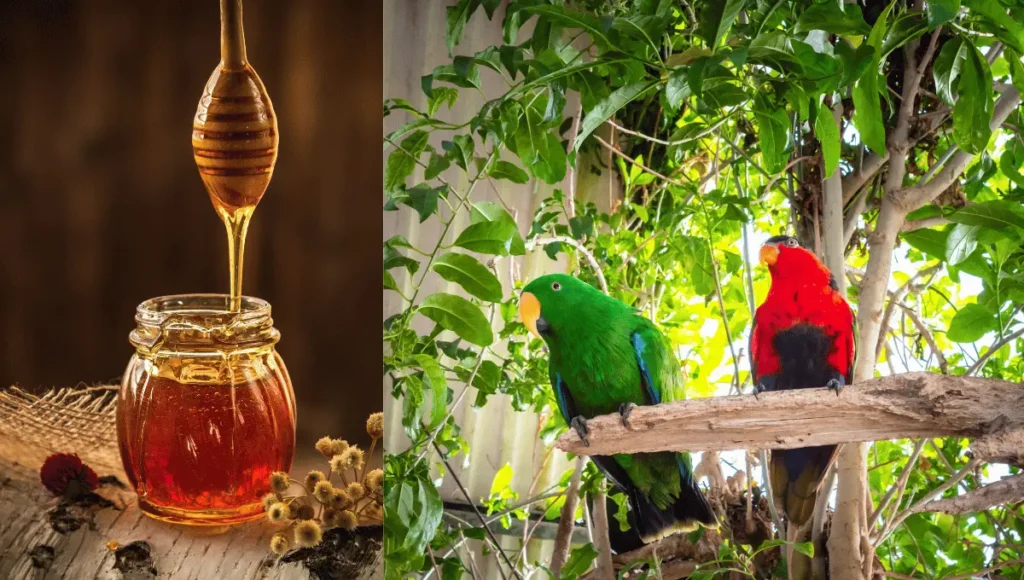
Honey is a sweet, natural product created by bees from the nectar they gather from flowers. It has been valued for its sweetness and potential health benefits for centuries. While it’s a popular ingredient for humans, it’s essential to understand its types and nutritional makeup when considering it for parrots.
Types of Honey
Raw Honey
Raw honey is pure and unprocessed, harvested straight from the beehive. It contains natural enzymes, pollen, and sometimes bacteria, which can be harmful to parrots.
Processed Honey
Processed honey undergoes heating and filtration to eliminate impurities. While this makes it safer for human consumption, it doesn’t eliminate all risks for parrots, especially bacterial contamination.
Flavored Honey
Flavored honey often has added ingredients like spices or artificial flavors. These additives can be harmful or even toxic to parrots, making flavored honey an unsafe choice.
Nutritional Composition of Honey
Honey is rich in sugar, which gives it its sweet taste. It also contains small amounts of vitamins, minerals, and antioxidants. However, the high sugar content makes it unsuitable as a regular part of a parrot’s diet.
- Vitamins and Minerals: Honey has trace amounts of vitamin C, calcium, and iron, but not in quantities significant enough to benefit parrots.
- Sugar Content: The high sugar concentration can lead to weight gain and other health issues in parrots if consumed regularly.
Can Parrots Safely Eat Honey?
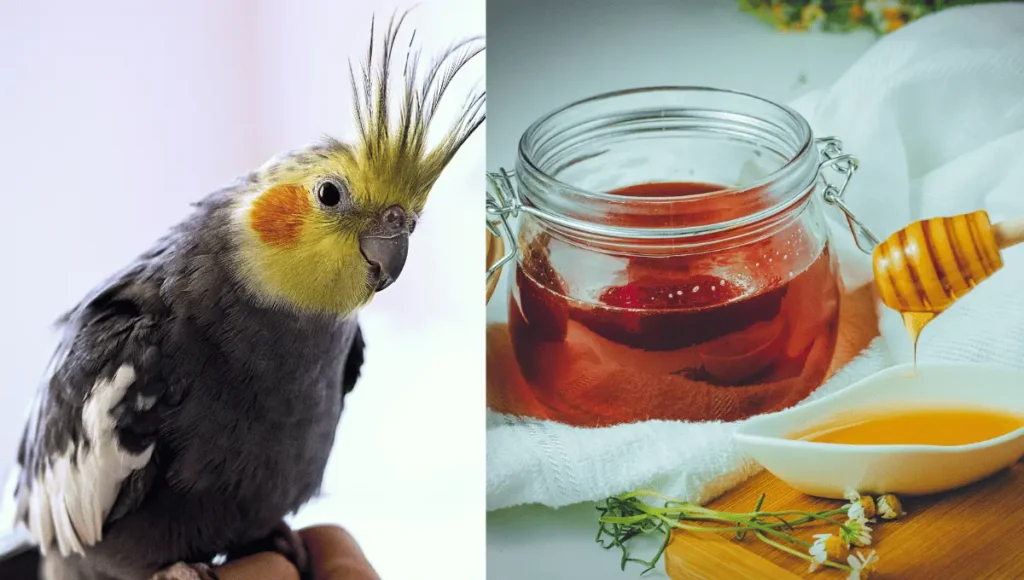
Honey is a natural sweetener, but when it comes to parrots, it’s not as safe as it may seem. While honey has some beneficial properties, the risks often outweigh the rewards. Let’s explore both the potential benefits and the significant risks of feeding honey to parrots.
Benefits of Honey for Parrots
Energy Boos
Honey is rich in natural sugars, making it a quick and effective energy source. However, parrots rarely need this, as their regular diet provides adequate energy.
Antibacterial Properties
Some types of honey, particularly raw honey, have antibacterial properties. These can help fight infections in humans, but there’s no clear evidence that parrots benefit in the same way.
Risks of Feeding Honey to Parrots
Bacterial Contamination
Raw honey can contain harmful bacteria like Clostridium botulinum, which causes botulism. Parrots have delicate digestive systems, making them more vulnerable to these toxins.
High Sugar Content
The high sugar levels in honey can lead to weight gain, obesity, and other health problems like diabetes in parrots. These conditions can shorten their lifespan and reduce their quality of life.
Digestive Issues
Honey is not a natural part of a parrot’s diet, and consuming it can upset their digestive system. This might cause diarrhea or discomfort.
Raw vs. Processed Honey: Which is Safer?
Raw Honey
Raw honey is often considered more “natural” but carries a higher risk of bacterial contamination. This makes it especially unsafe for parrots.
Processed Honey
Processed honey is heated to kill bacteria, but it doesn’t eliminate all risks. The sugar content remains high, and additives in some processed varieties can harm parrots.
Is Honey Safe?
While honey might seem like a sweet treat, the risks of bacterial contamination, high sugar, and digestive upset make it unsuitable for parrots, it’s better to choose healthier, parrot-safe treats to ensure their well-being.
Parrots Eat Honey
| Aspect | Details |
| Can Parrots Eat Honey? | Yes, parrots can eat honey, but it should be given in moderation. |
| Nutritional Value | Honey is packed with sugars, antioxidants, and small amounts of vitamins. It can provide a quick energy boost. |
| Health Benefits | Honey can be soothing for a parrot’s throat and may have antimicrobial properties. |
| Risks/Concerns | – High sugar content can contribute to obesity and diabetes if consumed excessively. |
| – Honey is sticky and may cause respiratory issues if it clogs the beak or throat. | |
| Types of Honey | Organic, raw honey is the best choice, as it’s free from added sugars and chemicals. |
| Serving Recommendations | – Offer small amounts as an occasional treat. |
| – Mix with other bird-safe foods to prevent overconsumption. | |
| Alternatives to Honey | – Fruits (e.g., apples, bananas) for natural sweetness. |
| – Other bird-safe treats like vegetables or seeds. |
Expert Opinions on Feeding Honey to Parrots
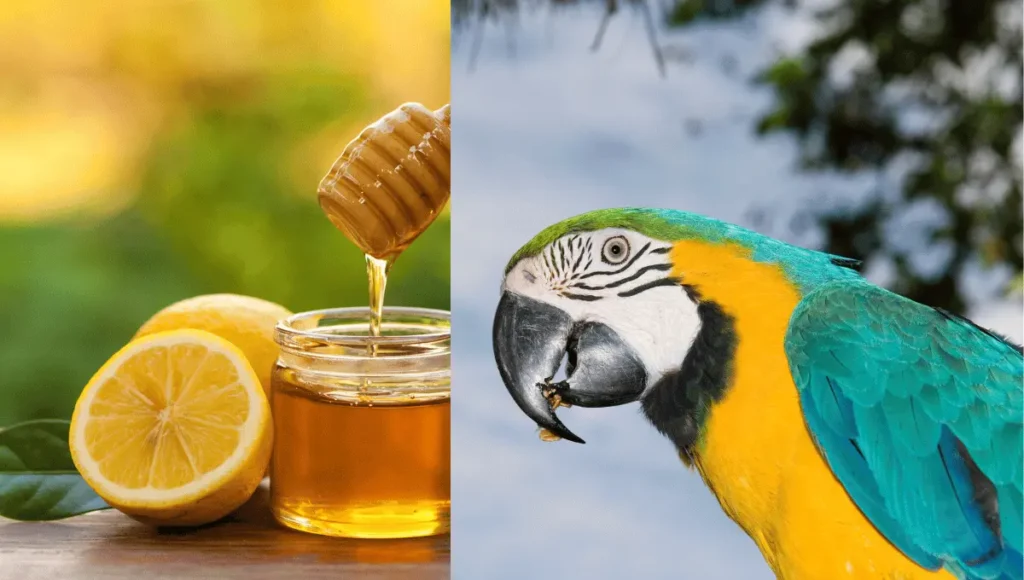
Feeding honey to parrots is a debated topic among bird owners, but experts generally advise against it. Let’s take a closer look at what veterinarians and avian specialists say about honey and why they recommend safer alternatives.
Veterinarian Advice on Honey for Parrots
Health Risks
Veterinarians highlight that honey, especially raw honey, poses significant health risks for parrots. The potential presence of harmful bacteria like Clostridium botulinum is a major concern. Parrots’ sensitive digestive systems are not equipped to handle such bacteria, which can lead to severe illness or even death.
Unnecessary Sugar
Experts also emphasize that parrots do not need the extra sugar found in honey. Their natural diet of fruits, seeds, and pellets already provides the necessary nutrients without adding excess sugar, which can cause obesity and related health issues.
Recommendations for Alternative Treats
Fresh Fruits
Parrots love fresh fruits like apples, berries, and mangoes. These are not only naturally sweet but also packed with vitamins, minerals, and fiber, making them a far better option than honey.
Parrot-Safe Snacks
Veterinarians suggest offering parrots safe, specially formulated bird treats available at pet stores. These treats are designed to meet a parrot’s nutritional needs without adding unnecessary sugars or risks.
DIY Treats
Homemade snacks made with parrot-safe ingredients like oats, unsweetened coconut, and fresh fruit can be a fun and healthy way to treat your bird.
Final Thoughts from Experts
Experts agree that while honey is a popular natural sweetener for humans, it doesn’t belong in a parrot’s diet. The risks of bacterial contamination and excessive sugar outweigh any potential benefits. By sticking to natural, parrot-safe foods, you can ensure your bird stays healthy and happy. Always consult a veterinarian before introducing new foods to your parrot’s diet.
Alternatives to Honey for Parrots
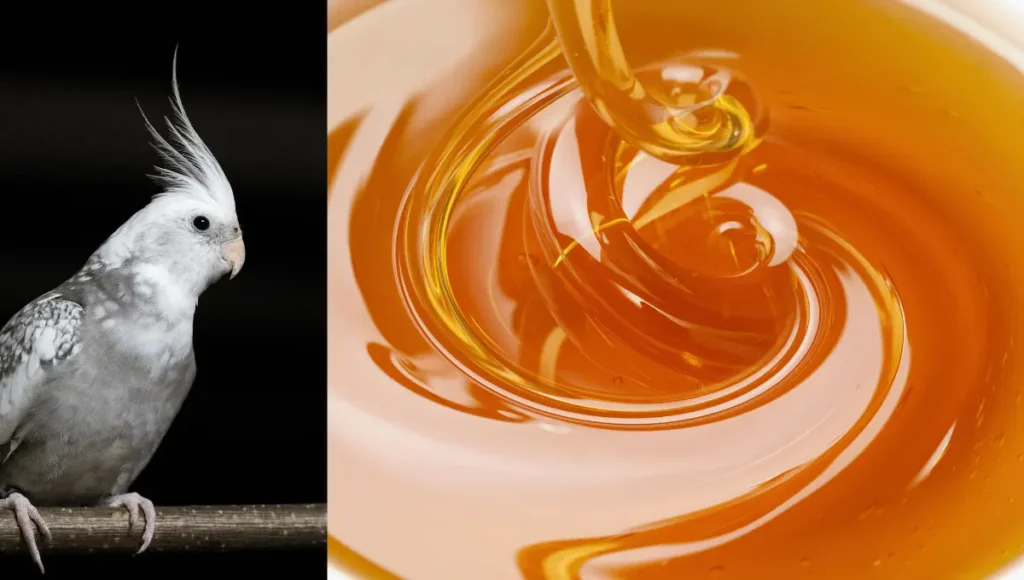
If you’re looking for a safe, healthy treat for your parrot, there are many great alternatives to honey that provide both nutrition and enjoyment. These options are better for your bird’s health and are often more natural. Here are some excellent alternatives you can offer your parrot.
Safe Sweet Treats
Fresh fruits are one of the best alternatives to honey. They are naturally sweet and packed with vitamins, minerals, and fiber, making them a perfect treat for your parrot. Apples make an excellent choice, but be sure to remove the seeds before offering them to your parrot.
Berries like strawberries, blueberries, and raspberries are not only sweet but also rich in antioxidants. Grapes, in moderation, can be another tasty choice.
Bananas can be offered in small portions as they are high in sugar, and pineapple provides a tropical sweetness that your parrot will love. These fruits are not only delicious but also provide important nutrients like vitamin C, which helps boost your parrot’s immune system.
Unsweetened applesauce is another great option. It has the natural sweetness of apples but without the added sugar, making it a safer choice for your parrot. Be sure to choose unsweetened applesauce with no artificial additives.
Coconut is also an excellent treat for parrots. Fresh coconut, without added sugar, offers a natural sweetness and healthy fats that can be beneficial for your bird when offered in moderation. You can give your parrot small pieces of coconut meat or dried coconut flakes, but avoid anything that’s sweetened or processed.
Enriching Treat Ideas
Nuts, when given in moderation, can also be a fantastic treat for your parrot. They provide healthy fats and protein which are important for a balanced diet. Almonds, walnuts, and pistachios are great choices, but always make sure to remove the shells. Steer clear of salted or flavored nuts, as they may pose a risk to your bird’s health.
Vegetables can also make delicious and nutritious treats for parrots. Carrots are a good source of vitamins, while sweet potatoes provide healthy carbohydrates. Parrots can also enjoy spinach, which is packed with iron, and bell peppers, which are rich in vitamin C. These vegetables help keep your parrot healthy with essential nutrients like fiber, antioxidants, and vitamins.
If you enjoy baking, you can make your own homemade parrot treats. Using ingredients like oats, seeds, and dried fruit (without sugar or preservatives), you can create healthy and tasty snacks for your bird. Mixing oats with chopped fruits or vegetables and baking them into small treats is a great way to provide a special snack for your parrot. When making homemade treats, you have full control over the ingredients, ensuring they are safe for your bird.
Healthy Parrot Snacks to Avoid
While there are plenty of healthy treat options, it’s important to avoid snacks that are too sugary or processed. Parrots should not have treats that are high in salt, fat, or sugar, such as sugary cereals or human snacks. This can result in health issues such as weight gain or digestive disturbances. Always check labels and avoid foods that contain additives, preservatives, or anything that could be harmful to your bird.
Conclusion
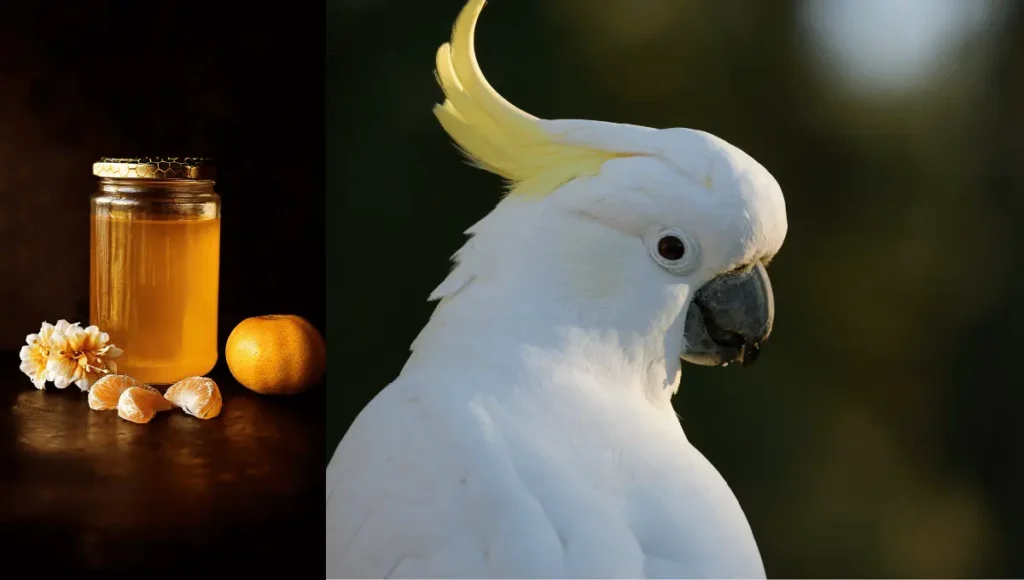
In conclusion, while it may be tempting to offer your parrot honey as a treat, it’s best to avoid it due to the potential health risks it poses. The high sugar content and possible bacterial contamination make honey an unsuitable option for your bird.
Thankfully, there are many safe and nutritious alternatives, like fresh fruits, vegetables, and homemade treats, that can provide your parrot with a tasty and healthy snack. By choosing the right foods and consulting with a vet, you can keep your parrot happy and thriving for years to come.
FAQs
Can parrots eat honey safely?
No, honey can be risky for parrots due to its high sugar content and the potential for bacterial contamination, especially in raw honey.
What are the risks of feeding honey to parrots?
Honey can cause digestive problems, weight gain, and even serious illness from harmful bacteria like botulism.
What are some safe alternatives to honey for parrots?
Safe alternatives include fresh fruits like apples, berries, and bananas, as well as vegetables and homemade parrot treats.
Why is honey not recommended for parrots?
Honey is overly sugary and can contribute to obesity and other health issues in parrots. Raw honey may also carry harmful bacteria that can be dangerous for them.
How can I provide a balanced diet for my parrot?
Offer a variety of fresh fruits, vegetables, seeds, and specially formulated bird treats to ensure your parrot gets the right nutrients. Always consult a vet for dietary advice.
Pingback: Can Parrots Eat Dates? A Complete Guide for Owners